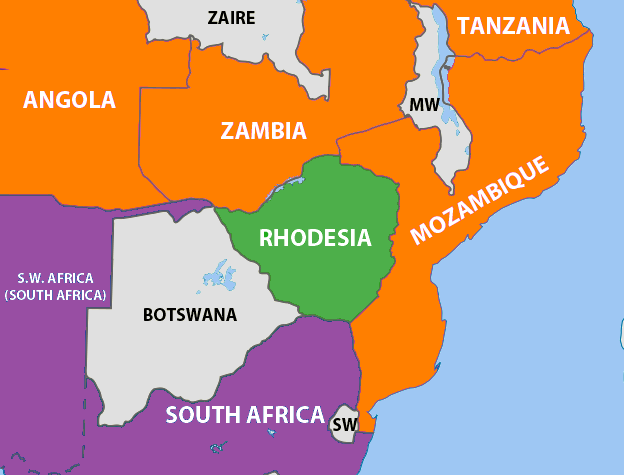Background:
 The war that took place in Rhodesia between 1964 and
1975 is known by different names: the Zimbabwe War of Liberation, the Second
Chimurenga, or the Bush War. Just as there are multiple names for this war, there are multiple perspectives in framing this conflict. To the white minority of three thousand who lived in the southern African county, it was a struggle against Communism and a fight to preserve a way of life. To the black nationalists seeking to establish majority rule, it was a struggle for equality representative democracy, and independence. This little-known chapter in the Cold War has received relatively little scholarly attention from a conflict management perspective. Most likely, this is because of the distasteful and exclusionary nature of the Smith government. Although the regime might have been abhorrent, the Bush War itself is not best left relegated to the past, because we can learn lessons about conflict management from it.
The war that took place in Rhodesia between 1964 and
1975 is known by different names: the Zimbabwe War of Liberation, the Second
Chimurenga, or the Bush War. Just as there are multiple names for this war, there are multiple perspectives in framing this conflict. To the white minority of three thousand who lived in the southern African county, it was a struggle against Communism and a fight to preserve a way of life. To the black nationalists seeking to establish majority rule, it was a struggle for equality representative democracy, and independence. This little-known chapter in the Cold War has received relatively little scholarly attention from a conflict management perspective. Most likely, this is because of the distasteful and exclusionary nature of the Smith government. Although the regime might have been abhorrent, the Bush War itself is not best left relegated to the past, because we can learn lessons about conflict management from it.
The Conflict:
 When Ian Smith unilaterally declared independence from the United Kingdom in 1965, he sought to lock down the hegemony of the white settler minority in Southern Rhodesia, fearing that his country might end up swept up in a Communist insurgency led by black nationalists such as in Zambia or Angola. As might have been predicted, shoring up white minority rule in Salisbury was a call to war for black nationalists. The Maoist Zimbabwe African National Liberation Army (ZANLA) and Marxist-Leninist Zimbabwe People's Revolutionary Army (ZIPRA) took up arms against Smith's government, engaging in open conflict at first, and then resorting to guerrilla tactics through the 1970s. When the Estado Novo regime in Portugal fell in 1974, Mozambique became independent, and ZANLA especially found an ally and territory from which to launch its operations. The conflict intensified through the mid-1970s, and had spread throughout Rhodesia, with ZIPRA concentrating in the northeast in and around Zambia and southwest in and around Botswana, and ZANLA using the border areas of Mozambique to conduct operations. As the conflict grew increasingly bloody, the US and UK called for a negotiated settlement. When the counterinsurgency was still going well, Salisbury was reluctant to agree to a cessation of hostilities. However, the Bush War drew itself out to become a war of attrition. The international community, and especially the United States and United Kingdom, sanctioned the Smith government since its establishment. Apartheid South Africa, for its part, provided a resource corridor for the Rhodesian government by allowing fuel and supplies into the country to feed the war effort. However, by the late 1970s, time was no longer on Smith's side, as the economy took a downturn due to increasing numbers of white males being drafted, increased sanctions, and the flight of many of the white settlers from the country. In a military stalemate and with even South Africa wishing to distance itself from Rhodesia, Smith finally agreed to a negotiated settlement. He came to share power with black moderates within the country and the state of Zimbabwe-Rhodesia was created. Finally, elections took place in 1979, with the majority of votes in favour of returning to colony status. With black majority rule now in place, the UK granted Zimbabwe independence in 1980.
When Ian Smith unilaterally declared independence from the United Kingdom in 1965, he sought to lock down the hegemony of the white settler minority in Southern Rhodesia, fearing that his country might end up swept up in a Communist insurgency led by black nationalists such as in Zambia or Angola. As might have been predicted, shoring up white minority rule in Salisbury was a call to war for black nationalists. The Maoist Zimbabwe African National Liberation Army (ZANLA) and Marxist-Leninist Zimbabwe People's Revolutionary Army (ZIPRA) took up arms against Smith's government, engaging in open conflict at first, and then resorting to guerrilla tactics through the 1970s. When the Estado Novo regime in Portugal fell in 1974, Mozambique became independent, and ZANLA especially found an ally and territory from which to launch its operations. The conflict intensified through the mid-1970s, and had spread throughout Rhodesia, with ZIPRA concentrating in the northeast in and around Zambia and southwest in and around Botswana, and ZANLA using the border areas of Mozambique to conduct operations. As the conflict grew increasingly bloody, the US and UK called for a negotiated settlement. When the counterinsurgency was still going well, Salisbury was reluctant to agree to a cessation of hostilities. However, the Bush War drew itself out to become a war of attrition. The international community, and especially the United States and United Kingdom, sanctioned the Smith government since its establishment. Apartheid South Africa, for its part, provided a resource corridor for the Rhodesian government by allowing fuel and supplies into the country to feed the war effort. However, by the late 1970s, time was no longer on Smith's side, as the economy took a downturn due to increasing numbers of white males being drafted, increased sanctions, and the flight of many of the white settlers from the country. In a military stalemate and with even South Africa wishing to distance itself from Rhodesia, Smith finally agreed to a negotiated settlement. He came to share power with black moderates within the country and the state of Zimbabwe-Rhodesia was created. Finally, elections took place in 1979, with the majority of votes in favour of returning to colony status. With black majority rule now in place, the UK granted Zimbabwe independence in 1980.
What Difference did Sanctions Make?
 Economic sanctions had the effect of isolating landlocked Rhodesia. The country's neighbours, with the notable exceptions of South Africa and Mozambique, had the effect of walling the country in so that not just trade but resupply for the war effort could barely take place. The black nationalists enjoyed increasing support from neighbouring countries and were trained and supplied by Communist states such as East Germany and the Soviet Union. After 1974, Mozambique also provided state support to ZANLA, and Rhodesia gained another hostile neighbour. Moreover, Pretoria's policy developed towards distancing itself from the white settler regime, leaving Smith without a friend in the world. In this light, real pressure was coming down on the Salisbury as the resource-hungry security forces were without long-run chances of resupply after a decade and a half of war. Although sanctions alone might not have broken the back of Smith's war effort, the combined isolation effects and the declining economic situation due to labour problems made a negotiated settlement look like the best option possible.
Economic sanctions had the effect of isolating landlocked Rhodesia. The country's neighbours, with the notable exceptions of South Africa and Mozambique, had the effect of walling the country in so that not just trade but resupply for the war effort could barely take place. The black nationalists enjoyed increasing support from neighbouring countries and were trained and supplied by Communist states such as East Germany and the Soviet Union. After 1974, Mozambique also provided state support to ZANLA, and Rhodesia gained another hostile neighbour. Moreover, Pretoria's policy developed towards distancing itself from the white settler regime, leaving Smith without a friend in the world. In this light, real pressure was coming down on the Salisbury as the resource-hungry security forces were without long-run chances of resupply after a decade and a half of war. Although sanctions alone might not have broken the back of Smith's war effort, the combined isolation effects and the declining economic situation due to labour problems made a negotiated settlement look like the best option possible.
Why Should we Care?
The example of Rhodesia shows us what can happen when the international community takes a unified approach in dealing with an illegal regime. Rhodesia became a pariah state such that eventually not even Apartheid South Africa would support it. Rhodesia's economy pre-conflict was strong, but declined steadily as the costs of war mounted. This also demonstrates the vulnerability of a landlocked state to a sanction regime. It is worth noting that Western states took little action beyond diplomatic and economic pressure on the Smith government. A military invasion of Rhodesia was not necessary to see the transition to black majority rule in the country.
Further Reading:
Mills, Greg, and Grahame Wilson. “Who Dares Loses? Assessing Rhodesia’ Counter-Insurgency Experience.” The RUSI Journal 152.6 (2007): 22-31. Web. 04 Apr 16. http://www.thebrenthurstfoundation.org/files/Who-Dares-Loses.pdf.
Onslow, Sue, ed. Cold War in Southern Africa: White Power, Black Liberation. London: Routledge, 2009. Web.
No comments:
Post a Comment